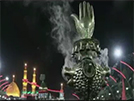saying - 141 to 160
- Details
- Hits: 1128
141. Imam Ali ibn Aba Talib, peace be upon him said: A small family is one of the ways of (securing) ease.
142. Imam Ali ibn Aba Talib, peace be upon him said: Loving one another is half the measure of wisdom.
143. Imam Ali ibn Aba Talib, peace be upon him said: Grief is half the old age.
144. Imam Ali ibn Aba Talib, peace be upon him said: Endurance comes according to affliction. Whoever beats his hand on the thigh in his affliction ruins all his good actions.
145. Imam Ali ibn Aba Talib, peace be upon him said: There are many who fast but whose fast is nothing more than hunger and thirst. There are many who offer of prayers and whose prayer is no better than wakefulness and hardship: the sleep as well as the eating and drinking of the intelligent (God-fearing) person is far better.
146. Imam Ali ibn Aba Talib, peace be upon him said: Protect your belief by charity; guard your wealth by paying Allah’s share thereof, and ward off the waves of calamity by praying.
Imam Ali ibn Aba Talib's Conversation With Kumayl ibn Ziyad al-Nakha`i
People are of three kinds:
147. Kumayl ibn Ziyad has related saying that Imam Ali ibn Aba Talib, peace be upon him caught hold of his hand and took him to the graveyard. When the Imam (p.b.u.h.) had passed through the graveyard and left the city behind, he let a deep sigh and said the following:
O Kumayl these hearts are containers. The best of them is that which preserves (its contents); so, preserve what I say to you:
People are of three types: One is the scholar and the Divine. Then, the seeker of knowledge who is also on the way to deliverance. Then the common rot who runs after every caller and bends in the direction of every wind. They seek no light from the glory of knowledge and do not take protection from any reliable support.
O Kumayl! Knowledge is better than wealth. Knowledge guards you, while you have to guard the wealth. Wealth decreases by spending, while knowledge multiplies by spending, and the results of wealth die as wealth decays.
O Kumayl! Knowledge is belief which is acted upon. With it, man acquires obedience during his life and a good name after his death. Knowledge is the ruler while wealth is ruled upon.
O Kumayl! Those who amass wealth are dead even though they may be living, while those endowed with knowledge will remain as long as the world lives. Their bodies are not available but their figures exist in the hearts. Look, here is a heap of knowledge (and Imam Ali ibn Aba Talib [p.b.u.h.] pointed to his bosom). I wish I could get someone to bear it. Yes, I did find (such a person), but either he was one who could not be relied upon, or he was one who exploits the religion for worldly gains and, by virtue of Allah’s favors on him, he will dominate the people, and through Allah’s pleas he will master His devotees. Or he was one who was obedient to the hearers of the truth but there was no intelligence in his bosom. At the first appearance of doubt, he will entertain misgivings in his heart.
So, neither this nor that was good enough. Either the man is eager for pleasures, easily led away by passions, or is covetous for collecting and hoarding wealth. Neither of them has any regard for religion in any matter. The nearest example of these is the loose cattle. This is the way that knowledge dies away with the death of its bearers.
O Lord! Yes! Yet the earth is never devoid of those who maintain Allah’s plea either openly and reputedly or, being afraid, as hidden in order that Allah’s pleas and proofs should not be rebutted. How many are they and where are they? By Allah, they are few in number, but they are great in esteem before Allah. Through them, Allah guards His pleas and proofs till they entrust them to others like themselves and sow the seeds thereof in the hearts of those who are like them.
Knowledge has led them to real understanding, so they have associated themselves with the spirit of conviction. They take easy what the easy going regard as hard. They endear what the ignorant take as strange. They live in this world with their bodies here but their spirits resting in the high above. They are the vicegerents of Allah on His earth and callers to His religion. O, how I yearn to see them! Go away, O Kumayl, wherever you wish!
148. Imam Ali ibn Aba Talib, peace be upon him said: Man is hidden under his tongue.
149. Imam Ali ibn Aba Talib, peace be upon him said: Whoever does not know his own worth is ruined.
On Preaching
150. Imam Ali ibn Aba Talib, peace be upon him said the following to a man who had requested him to preach:
Do not be like him who hopes for (bliss in) the next life without action and delays repentance by prolonging his desires, who utters words like ascetics in this world but whose deeds are like those who are eager for it. If he is granted something of it, he does not feel satisfied. If he is denied, he is not content. He is not grateful for what he gets and covets an increase in whatever remains with him. He curbs others (from wrongdoing) but not his own self. He commands others for what he himself does not do. He loves the virtuous but does not behave like them. He hates the vicious but he himself is one of them. He dislikes death because of the excess of his sins but adheres to that because of which he is afraid of death.
If he falls ill, he feels ashamed: if he is healthy, he feels secure and indulges in amusements. When he recovers from illness, he feels vain about himself. When he is afflicted, he loses hope. If distress befalls him, he prays like a bewildered man. When he finds ease of life, he falls into deceit and turns his face away. His heart overpowers him by means of imaginary things while he cannot control his heart by his conviction. For others, he is afraid of small sins, but for himself, he expects more rewards than his performance. If he becomes wealthy, he becomes self-conscious and falls into vice. If he is impoverished, he despairs and becomes weak.
He is brief when he is doing a good thing but goes too far when he is begging. When passion overtakes him, he is quick in committing sin but delays repentance. If hardship befalls him, he goes beyond the canons of the (Islamic) community. He describes instructive events but does not take instruction himself. He preaches at length but does not accept any preaching for himself. He is tall on speech but short on action. He aspires for things that will perish and ignores things that will last for good. He regards profit as loss and loss as profit. He fears death but does nothing in its anticipation.
He regards the sins of others as big but considers the same things for himself as small. If he does something in obedience to Allah, he considers it much, but if others do the same, he considers it small. He, therefore, rebukes others but flatters himself. Entertainment in the company of the wealthy is dearer to him than remembrance (of Allah) with the poor; he passes verdicts against others for his own interests and does not do so against himself for others’ interests. He guides others but misguides himself. He is obeyed by others but he himself disobeys (Allah).
He seeks the fulfillment of obligations (to himself) but does not fulfill his own obligations (towards others). He fears the people (and deeds) for others besides his Lord (Allah) and does not fear his Lord in dealing with the public.
Sayyid ar-Razi says that if this book had contained nothing save this short statement, it will have sufficed as a successful piece of preaching, a specimen of high philosophy, an objective of wisdom for the onlooker and a source of instruction for the meditative onlooker.
151. Imam Ali ibn Aba Talib, peace be upon him said: Every human being has to meet the end, sweet or sour.
152. Imam Ali ibn Aba Talib, peace be upon him said: Every comer has to return, and after returning, it is as though he never existed.
153. Imam Ali ibn Aba Talib, peace be upon him said: The one who endures does not miss success although it may take a long time.
154. Imam Ali ibn Aba Talib, peace be upon him said: Whoever agrees with the action of a group of persons is as though he joins them in that action. And everyone who joins in wrong commits two sins: one sin for committing the wrong and the other for agreeing with it.
155. Imam Ali ibn Aba Talib, peace be upon him said: Adhere to your covenants and entrust their fulfillment to steadfast persons.
156. Imam Ali ibn Aba Talib, peace be upon him said: On you lies (the obligation of) obedience to the person about whom you cannot plead the excuse of ignorance.
157. Imam Ali ibn Aba Talib, peace be upon him said: Your minds are opened when you see, and you are guided when you receive guidance, and you are made to hear when you do hear.
158. Imam Ali ibn Aba Talib, peace be upon him said: Remonstrate with your brother by being kind to him, and respond to his evil by being generous to him.
159. Imam Ali ibn Aba Talib, peace be upon him said: If one places himself where he may be charged, let him not blame those who may think ill of him.
160. Imam Ali ibn Aba Talib, peace be upon him said: One who possesses prefers himself over others.











